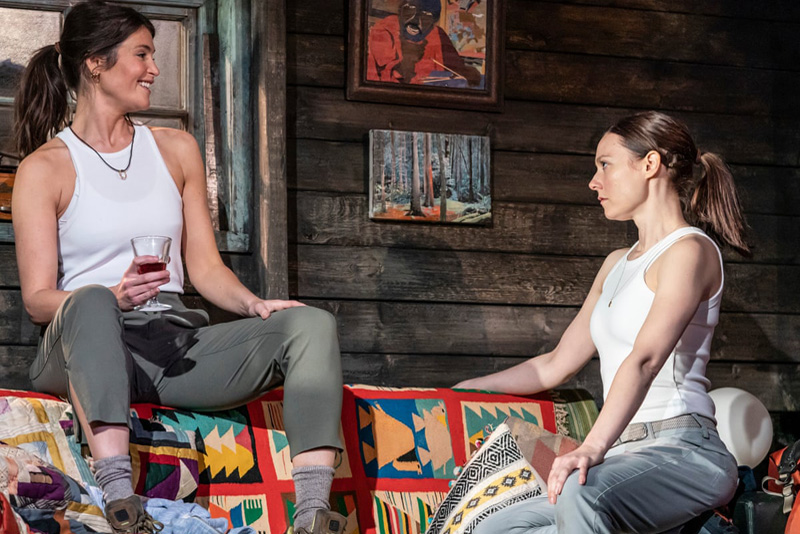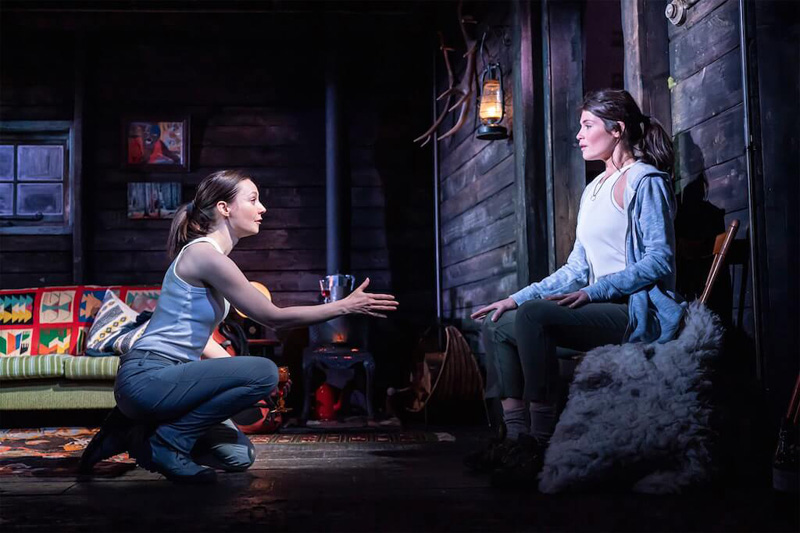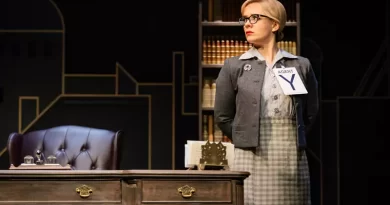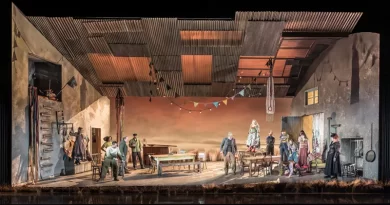“Walden”: Harold Pinter Theatre
Jay Paul Skelton
29 May 2021
Sonia Friedman, the well-known British producer, has not only led the charge as theatres cautiously reopen here in the United Kingdom, but she is also responding to the conversations that have emerged from our collective experience of the past year or so. She has secured the Harold Pinter Theatre, one of the more intimate West End theatres. to present “RE:EMERGE”, a season of “new plays for a new world” that focus on contemporary issues and feature a welcome collection of diverse casts and creative teams under the artistic directorship of Ian Rickson. It’s a bold move that proves a testament to Friedman’s commitment to fostering fresh work and taking positive action in regard to representation of traditionally marginalized communities.

Gemma Arterton and Lydia Wilson.
Photo credit: Johan Persson.
Walden, a new work by US-based writer and performer Amy Berryman, is the first out of the gate for the three-play series. and it attempts to weave familial conflict. climate change, and space exploration into a compact one hour and 45 minutes. It’s an ambitious endeavour that matches in spirit Friedman’s own effort with the season. However, despite a handsome physical production. a bevy of ideas, and some familiar names on the stage and behind the scenes, the production proves to be talky and static in equal measure.
The play is set in an unspecified time in the future where the world is experiencing a number of environmental catastrophes linked to climate change. You wouldn‘t have known it as you nestled in your seat and feasted your eyes on Rae Smith’s beautifully ramshackle, wood-framed cottage, exquisitely lit by Azusa Ono and filled with earthenware, glass jars. and wool blankets and surrounded by greenery – both wild and potted – to create an idyllic haven that evoked the titular woods. It’s a refuge for Stella, a former NASA architect. and her fiancé Bryan, who identifies as something called an “Earth Advocate” aiming to live a technology-free life in the face of overwhelming environmental calamities.
The play begins with the pair awaiting the arrival of Stella’s twin sister, Cassie, a NASA botanist who is a part of a scheme that hopes to colonize Mars for human habitation before our planet expires. It soon becomes apparent that Cassie is visiting only to convince Stella to return to NASA and bring her skills to the colonization progamme. It’s a highly specific set of circumstances that triggers any number of arguments about the ethics of space exploration, the futility of trying to save the planet, and the burden of living up to others’ expectations. But it ultimately serves as a context for Stella and Cassie to reignite and resolve the long-standing tensions that have festered between them for years.
I’ll start with the good news. The performers bring their best to the garrulous proceedings with Gemma Arterton, whom I last saw in the West End whipping up a comedic frenzy as the notorious Restoration actress Nell Gwyn, finding both humour and pathos in the role of the conflicted former architect. Lydia Wilson, who made a haunting appearance as the title character in The Duchess of Malfi at the Almeida Theatre, is all steely determinism to Cassie as she attempted to argue her case to her reticent sister. Fehinti Balogun as Bryan exudes never-ending warmth in an otherwise thankless role, often acting as witness or referee to the primary conflict between Stella and Cassie. I look forward to seeing each of these performers again on any stage in any production.
I’ve also already mentioned the evocative designs from Smith and Ono. But the former also offers some clever futuristic touches as necessary. For example, both Stella and Cassie use an illuminated phone that activates by the user’s outstretched hand rising from the screen. In addition, the final scene reveals some hidden tricks that transform the cottage into an interplanetary communication centre that allow the sisters to confirm the resolution of their conflict. I should also mention the lovely music and sound design by Mark Bradshaw and Emma Laxton respectively. They collectively support the natural environment and help ease us gently into and out of the transitions.

Lydia Wilson and Gemma Arterton.
Photo credit: Johan Persson.
I suggested at the start of this review that Walden was talky, but I’d like to qualify that term. Some oft he greatest plays and playwrights might be considered talky, like any of August Wilson’s works or Angels in America by Tony Kushner, but these feature characters who are trying to articulate often profound experiences and express themselves in memorable ways. In Walden, it seems everyone is not only trying to get someone else to really talk to them about something but also is happy to explain everything to everyone else. I’m not sure that Berryman trusts her allusions or that themes are being communicated clearly so she feels the need to make sure they are spelled out at every turn. For example, Stella’s name, especially in the context of the character’s former position in NASA, invites the listener to make an association with the word “stellar” or in my case, recall the famous line “Stella for star!” from A Streetcar Named Desire by Tennessee Williams. However, Berryman ensures that Stella has the opportunity to spell out its meaning for us. (Spoiler alert! It’s a diminutive for constellation.) It’s this endless explaining that makes the evening feel longer than its relatively short running time.
I also found it curious that director Ian Rickson offers little variety to the staging given the extent of the conversations happening during each scene. The set is pushed far forward towards the lip of the stage, no doubt to take advantage of the intimacy the Harold Pinter allows. But it gives few places for his actors to go. I saw several places where characters might sit, perch or lean. But the predominant compositional picture consisted of either two people standing and facing each other or three people standing and facing one another or, in poor Bryan’s case, standing behind Stella and Cassie and watching them standing and facing each other. Rickson is no stranger to garrulous characters given his experience with Jez Butterworth’s Jerusalem and The Weir by Conor McPherson. But here his strategy to emphasize the delivery of dialogue over any stage movement doesn’t help the production. It seems to doom it instead.
The REEMERGE season is a welcome gesture that provides a workable model for the current situation: new works, short runs, fresh laces, and experienced hands. I admire Friedman’s intentions to respond to the needs of the moment as I do Berryman’s and her desire to tackle big ideas amidst the strains of family dynamics. I just hope for better things in the future in both cases.









